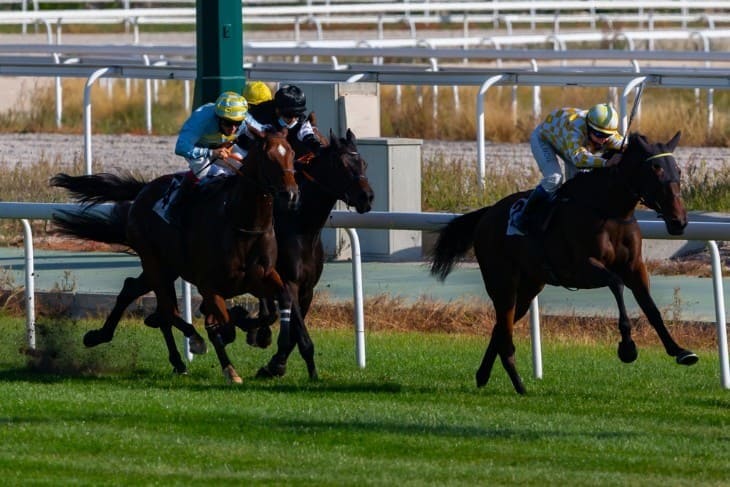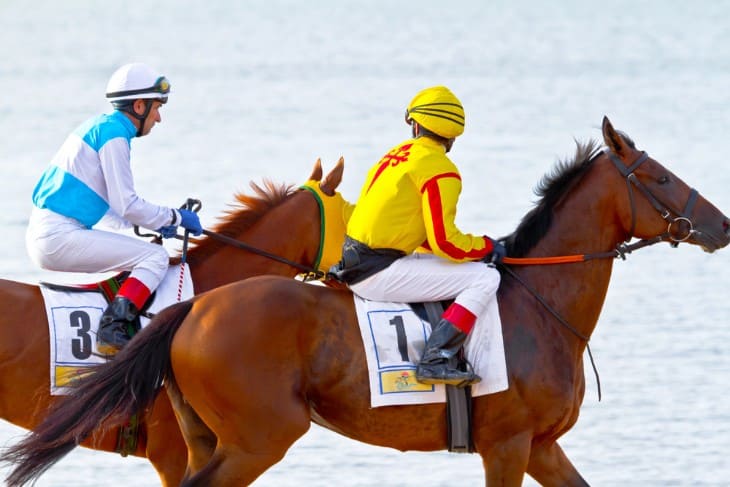- The Historical Roots of UK Horse Racing
- Iconic British Racecourses: Carrying the Heritage Torch
- Behind Every Race: The Intricacies of Racecourse Management
- Spotlight on Equine Athletes: Breeds and Training
- Jockeys and Trainers: The Masters of the Race
- Betting in Horse Racing: The Thrill of the Wager
- Upholding the Sport: Governance in Horse Racing
- The Broader Horse Racing Ecosystem
- The International Footprint of UK Horse Racing
- Facing the Future: British Horse Racing's Challenges and Prospects
- Conclusion
Deeply rooted in British culture, horse racing is a timeless emblem of tradition, thrill, and status. The UK's rich tapestry is punctuated by the sounds of racehorses speeding along green tracks, attracting eager crowds. This piece delves into the enthralling realm of horse racing, exploring its multifaceted structure.
The Historical Roots of UK Horse Racing
The origins of horse racing in Britain trace back to medieval times, when swift horses were raced in casual matches. Over the ages, these humble events transformed into the impressive displays observed today, enriched by time-honoured practices and modern advancements.
During King Charles II's reign in the 17th century, horse racing adopted a more structured form, spurred by the King's keen interest. This era witnessed the inception of official racecourses like Newmarket, which still remains central to British racing.
As the years passed, horse racing became an integral part of the nation's culture. Iconic races such as The Derby in 1780 and The Grand National in 1839 captivated the British populace and the world. These events have become significant, offering anticipation, glamour, and fierce competition.

Iconic British Racecourses: Carrying the Heritage Torch
The UK is home to revered racecourses, each with its history of victories, legends, and unforgettable events. Epsom Downs, the venue for The Derby, embodies the grandeur of British racing. In contrast, Aintree's challenges, notably Becher's Brook and The Chair, offer a spectacle during The Grand National, captivating a global audience.
Newmarket, often labelled as the "Home of Horseracing," is rich in history and distinction. Places like Ascot, York, Cheltenham, and Goodwood further contribute to the UK's racing story, each hosting events that draw international acclaim.
Behind Every Race: The Intricacies of Racecourse Management
Behind the racing excitement is a well-orchestrated setup that ensures smooth event execution. Groundkeepers ensure racecourses are in top condition, while grandstands and suites are set to host thousands. Meanwhile, state-of-the-art technology, including precise timing systems and interactive betting stations, augments the spectator experience.
Spotlight on Equine Athletes: Breeds and Training
Central to horse racing are the horses themselves, bred for various disciplines. The UK takes pride in a diverse range of horse breeds. Thoroughbreds are prevalent in flat racing, undergoing intense training routines from early stages. National Hunt races, on the other hand, require speed and obstacle navigation skills, met by breeds like the sturdy Irish Draught.
Trainers, with deep equine knowledge, guide these horses, fostering trust and refining their abilities.
Jockeys and Trainers: The Masters of the Race
Jockeys and trainers play pivotal roles in the racing landscape. Jockeys merge with their horses, guiding them through the race's twists and turns. Trainers, meanwhile, focus on training strategies, health, and race planning, forming a bond with their charges.
Betting in Horse Racing: The Thrill of the Wager
Betting is an intrinsic part of British horse racing, transforming races into exhilarating events of suspense. From traditional bookies to online platforms, the betting realm has expanded, offering myriad options for both newcomers and seasoned betters.
Upholding the Sport: Governance in Horse Racing
Ensuring the sport's integrity and credibility is vital. The British Horseracing Authority (BHA) is instrumental in formulating and enforcing rules, from horse welfare to betting fairness, maintaining the sport's authenticity.

The Broader Horse Racing Ecosystem
Horse racing is supported by several industries, from hospitality to media. TV broadcasts and streaming make races accessible globally, while the fashion industry adds glamour to race days.
The International Footprint of UK Horse Racing
British horse racing's influence spans the globe. Iconic races like the Royal Ascot attract international participants. Additionally, the UK's horse breeding expertise is globally acknowledged, with British bloodlines highly sought after.
Facing the Future: British Horse Racing's Challenges and Prospects
Key challenges for the sport include balancing tradition with innovation and ensuring horse welfare. As the sport moves forward, it must address economic, regulatory, and post-Brexit implications.
Conclusion
Despite challenges, the future of British horse racing looks promising. Its global appeal, anchored in its heritage and thrill, continues to grow. In wrapping up this exploration of UK horse racing, we recognise its enduring appeal, the commitment of its community, and its power to fascinate, bring people together, and inspire. The sport strides towards a future where past and present converge, crafting a continually evolving legacy.
For Furter Reading:







